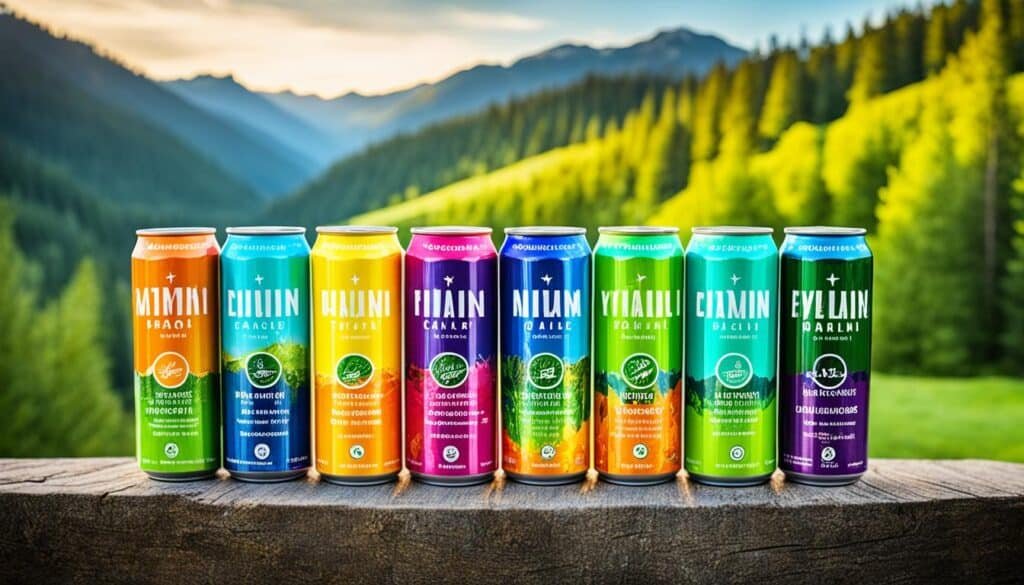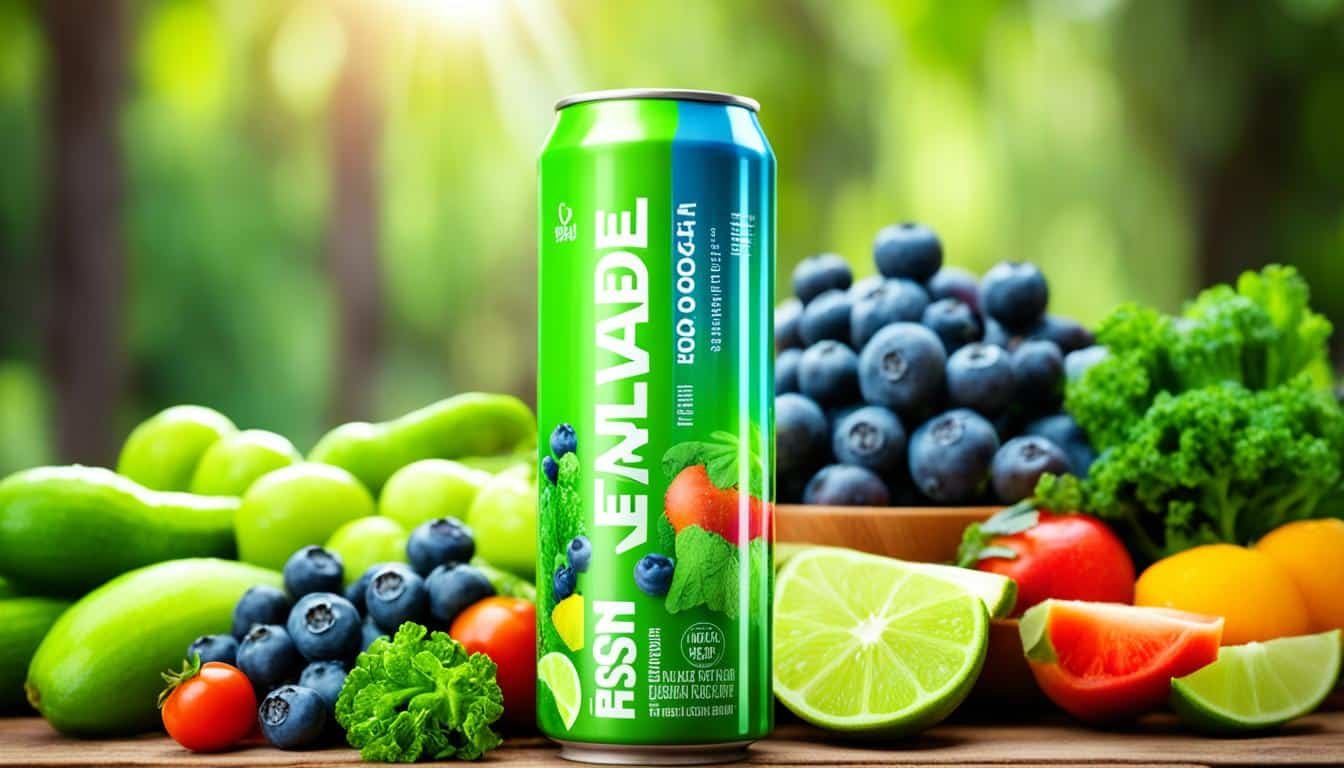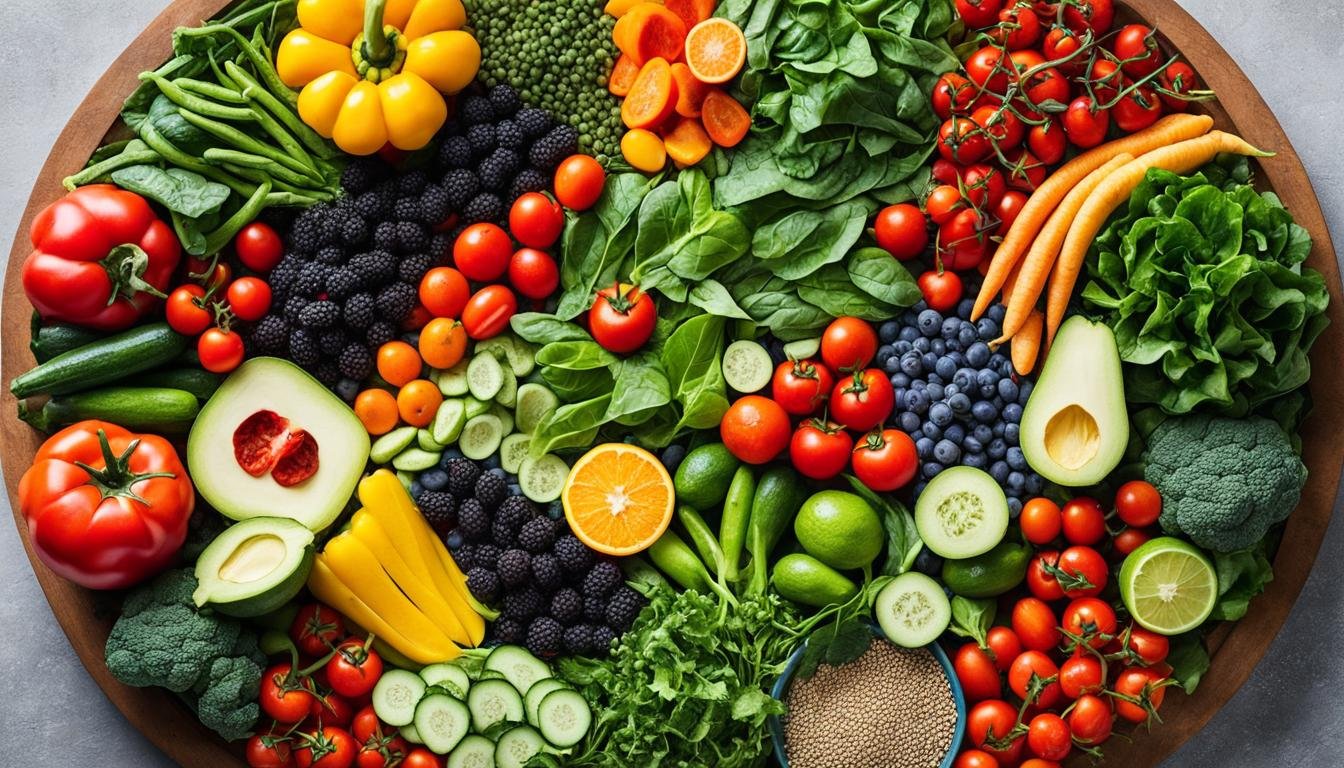Are you on the hunt for the healthiest energy drink? Look no further! In this article, we will provide you with valuable tips and tricks to help you make informed choices when selecting an energy drink. It’s essential to prioritize your health and fuel your body with the best options available.
Key Takeaways:
- Many energy drinks are loaded with added sugar and stimulants, which can be unhealthy for your body.
- Most energy drinks are not well regulated, allowing for potentially harmful ingredients to be included.
- Understanding that caffeine is not a source of energy is important when selecting an energy drink.
- There are healthier options available, such as teas, regulated energy drinks, and drinks with natural ingredients.
- Avoid energy drinks with excessive caffeine, high sugar content, and undisclosed ingredients.
Now, let’s dive deeper into why most energy drinks are unhealthy and discover expert tips for choosing the healthiest energy drinks!
Why Most Energy Drinks Are Unhealthy
When it comes to energy drinks, the majority of them fall into the unhealthy category. This is primarily due to the lack of regulation and the inclusion of potentially harmful ingredients.
Unlike traditional beverages, most energy drinks are classified as dietary supplements rather than properly regulated beverages. This FDA loophole allows for inaccurate labeling and the inclusion of ingredients that may pose risks to consumers.
One of the main culprits behind the unhealthy nature of energy drinks is the excessive amount of added sugar. Many popular brands load their products with high levels of sugar to create a sweet and addictive taste. Consuming these sugary drinks on a regular basis can contribute to various negative health effects, including weight gain, tooth decay, and an increased risk of chronic diseases like diabetes.
In addition to the high sugar content, energy drinks are often packed with caffeine, guarana, and B-vitamins. While small amounts of caffeine can provide a temporary energy boost, excessive consumption can lead to increased heart rate, sleep disturbances, and even digestive issues. Guarana, a plant extract that contains caffeine, is commonly found in energy drinks and can further contribute to the stimulant effect.
It’s essential to be aware of the potential risks associated with consuming energy drinks. These beverages may seem tempting for a quick energy fix, but their long-term impact on health should not be overlooked.
Most energy drinks are sold as dietary supplements rather than beverages, which means they are not well regulated by the FDA. This lack of regulation allows for inaccurate labeling and potentially harmful ingredients.
To get a better understanding of the health risks, let’s take a closer look at the potential negative effects of consuming energy drinks:
Risks of Most Energy Drinks:
- Increased heart rate: The combination of caffeine and other stimulants in energy drinks can cause an elevated heart rate, potentially leading to palpitations and irregular heart rhythms.
- Sleep disturbances: due to the high caffeine content, consuming energy drinks, especially later in the day, can disrupt sleep patterns and lead to increased difficulty falling asleep or staying asleep.
- Upset stomach: The high levels of caffeine and other stimulants in energy drinks can cause gastrointestinal discomfort, including stomachaches, nausea, and even vomiting.
- Dehydration: Energy drinks often have a diuretic effect due to caffeine, which can contribute to increased urine production and potentially lead to dehydration if not balanced with adequate hydration.
- Dependency: Regular consumption of energy drinks can lead to dependence and withdrawal symptoms if abruptly discontinued. This can be attributed to the addictive nature of caffeine.
It is crucial to be aware of these risks and choose healthier alternatives whenever possible to protect your long-term health.
In the next section, we’ll explore why caffeine itself is not a source of energy and why relying solely on energy drinks for a boost is not ideal.
First, Caffeine Is Not Energy
In the world of energy drinks, caffeine is often hailed as the magic ingredient that provides a burst of energy. However, it’s important to understand that caffeine is not actually a source of energy itself.
Energy, in the true sense of the word, comes from calories obtained from food, specifically carbohydrates. These calories are converted into usable energy by the body. While caffeine can certainly provide a temporary boost or stimulant effect, it does not directly provide the body with the energy it needs to function.
It’s essential to fuel your body with nutritious foods that contain carbohydrates, proteins, and fats to obtain real, sustained energy. Consuming a balanced diet and maintaining a healthy lifestyle are crucial for optimal energy levels.
“Caffeine may give you a temporary burst of alertness, but it doesn’t provide long-lasting, sustainable energy. To maintain energy levels throughout the day, focus on nourishing your body with a balanced diet and regular physical activity.”
If you rely solely on caffeine for energy, you may experience crashes or the need for increasingly higher doses to achieve the desired effect. This can have negative consequences on your overall well-being.
Instead of relying on caffeine alone, consider adopting healthy habits that promote sustained energy levels, such as getting enough sleep, staying hydrated, and engaging in regular exercise.
The Role of Caffeine in Energy Drinks
In the context of energy drinks, caffeine is often used as a key ingredient to provide a temporary energy boost. It acts as a stimulant that can increase alertness and improve cognitive function, but it should not be mistaken for a sustainable source of energy.
Many energy drinks contain high levels of caffeine, often exceeding the recommended daily intake for adults (around 400 milligrams). However, it’s important to note that the effects of caffeine can vary depending on an individual’s tolerance and sensitivity.
| Energy Drink | Caffeine Content |
|---|---|
| Red Bull | 80 milligrams per 8.4 fl oz |
| Bolt24 | 65 milligrams per 16 fl oz |
While the consumption of moderate amounts of caffeine is generally considered safe for most individuals, it’s important to be mindful of your overall caffeine intake and to avoid excessive consumption as it can lead to negative health effects.
Remember, true energy comes from nourishing your body with a balanced diet, proper hydration, and adequate rest, rather than relying on caffeine or energy drinks alone.
Healthiest Energy Drink Choices
When it comes to choosing an energy drink, there are healthier options available that can still provide a boost of energy. It’s important to prioritize drinks that contain safe amounts of caffeine and beneficial ingredients. Here are some top choices:
1. Black and Green Teas
Black and green teas are excellent choices for an energy boost. They contain natural caffeine, which can provide a mild stimulant effect without the excessive amounts found in other energy drinks. These teas also offer antioxidants that can promote overall health.
2. Coffee in Moderation
Coffee, when consumed in moderation, can be a safe and effective energy drink. It contains caffeine that can provide a temporary energy boost. However, it’s important to limit consumption to avoid negative effects such as jitters or sleep disturbances. Additionally, consider minimizing the use of added sweeteners or creamers to keep the drink healthier.
3. FDA Regulated Energy Drinks
Two energy drinks that are regulated by the FDA and offer a reasonable amount of caffeine and other nutrients are Red Bull and Bolt24. These drinks undergo strict quality control measures, ensuring that you are consuming a product that meets safety standards.
| Energy Drink | Caffeine Content | Key Nutrients |
|---|---|---|
| Red Bull | 80 mg per 8 fl. oz. | B-vitamins, taurine, and other nutrients |
| Bolt24 | 70 mg per 16.9 fl. oz. | Antioxidants, electrolytes, and vitamins |
When selecting energy drinks, be sure to read the labels carefully. Look for drinks with natural ingredients and avoid those with artificial sweeteners or excessive amounts of added sugar. Prioritizing drinks with clean and natural ingredients will help you make better choices for your health.

Remember, it’s important to consume energy drinks in moderation as part of a balanced diet and healthy lifestyle. They should not be relied on as a substitute for proper nutrition and restful sleep.
What to Avoid in Energy Drinks
When selecting an energy drink, it is important to avoid certain ingredients and characteristics. Making informed choices can help you steer clear of potential risks and negative health effects.
Avoid Excessive Caffeine
One of the main ingredients to watch out for in energy drinks is excessive amounts of caffeine. While caffeine can provide a temporary energy boost, consuming too much can lead to dangerous side effects such as increased heart rate, restlessness, and insomnia. It is crucial to choose energy drinks that contain reasonable caffeine levels to minimize the risk of adverse reactions.
Steer Clear of High Sugar Content
Another factor to avoid in energy drinks is high sugar content. Many energy drinks are loaded with added sugars, which can lead to energy crashes, weight gain, and negative impacts on overall health. Opting for drinks with little to no added sugars can help you maintain stable energy levels throughout the day.
Choose Drinks with Clear Ingredient Lists
When selecting energy drinks, it is essential to choose ones with clear ingredient lists. Avoid drinks with undisclosed ingredients or questionable blends, as they may contain harmful substances or additives. By opting for transparently labeled energy drinks, you can make more informed decisions and ensure that you are consuming safe and healthy beverages.
“Avoid drinks with undisclosed ingredients or questionable blends, as they may contain harmful substances or additives.”

| Ingredients to Avoid | Risks |
|---|---|
| Excessive caffeine | Dangerous side effects such as increased heart rate and sleep disturbances |
| High sugar content | Energy crashes, weight gain, and negative impact on overall health |
| Undisclosed ingredients or questionable blends | Potential exposure to harmful substances or additives |
By avoiding excessive caffeine, high sugar content, and choosing energy drinks with clear ingredient lists, you can make healthier choices and minimize potential risks associated with these beverages.
Expert Tips for Choosing the Healthiest Energy Drink
When it comes to selecting the healthiest energy drink, experts recommend considering a few key factors. By paying attention to the quality of ingredients, caffeine levels, and added sugar content, you can make a more informed decision about which energy drink is right for you.
One of the important criteria to look for is the amount of caffeine in the drink. While caffeine can provide a temporary energy boost, excessive intake can have negative effects on the body. It is advisable to choose energy drinks with appropriate caffeine levels that align with your personal tolerance.
Additionally, considering the amounts of other beneficial ingredients, such as magnesium and potassium, can be helpful. These minerals contribute to overall well-being and can support energy production in the body.
Another aspect to consider is the level of added sugar in the energy drink. High sugar content can lead to energy crashes and negatively impact your health. Opting for drinks with reasonable amounts of added sugar or those sweetened with natural alternatives like stevia can be a healthier choice.

“Choosing the healthiest energy drink requires careful consideration of ingredients, caffeine levels, and added sugars. By paying attention to these factors, you can make a more informed decision and prioritize your well-being.” – Dr. Jane Thompson, Nutrition Expert
Educating yourself about energy drink ingredients is essential for making wise choices. Reading labels and researching brands can provide valuable insights into the composition and potential effects of the drinks you are considering. Choosing energy drinks that offer sustained energy rather than quick boosts can also contribute to a healthier lifestyle.
Potential Risks of Energy Drinks
While energy drinks can provide a quick boost of energy, it’s important to be aware of the potential risks associated with their consumption. Excessive intake of energy drinks or consuming them with certain health conditions can pose serious health risks.
One of the main concerns with energy drinks is their high caffeine content. Caffeine stimulates the central nervous system, increasing heart rate and blood pressure. When consumed in excess, it can lead to palpitations, arrhythmias, and even cardiac arrest in susceptible individuals.
The added sugar in energy drinks is another major concern. High sugar intake can contribute to weight gain, metabolic disorders, and dental problems. It can also result in energy crashes and increased fatigue once the initial sugar rush wears off.
Sleep disturbances are another potential risk of energy drinks. The combination of caffeine and sugar can disrupt normal sleep patterns, leading to insomnia or poor-quality sleep. Lack of adequate rest can have detrimental effects on overall health and well-being.
Also Read:- Elevate Your Energy Safely: A Guide To Energy Drinks For Diabetics
It’s also crucial to consider the possible interactions between energy drink ingredients and medications. Some ingredients in energy drinks, such as caffeine and certain herbs, can interact with medications and either reduce their effectiveness or amplify their side effects. It’s important to consult with a healthcare professional if you’re taking any medications and considering consuming energy drinks.
Individuals with certain health conditions need to exercise caution when consuming energy drinks. People with heart problems, high blood pressure, diabetes, anxiety disorders, or caffeine sensitivity should avoid or limit their intake of energy drinks. These conditions can be aggravated by the stimulants and high caffeine content found in energy drinks.
“The combination of high caffeine levels and added sugars in energy drinks can have a profound impact on cardiovascular health, sleep patterns, and overall well-being. It’s important to assess one’s individual health status and consider the potential risks before consuming energy drinks.”
In conclusion, while energy drinks may provide a temporary energy boost, it’s essential to weigh the potential risks associated with their consumption. Excessive caffeine, high sugar content, sleep disturbances, medication interactions, and certain health conditions can all contribute to negative effects on health. It’s always best to prioritize a balanced diet, regular exercise, and a sufficient amount of rest for sustained energy rather than relying on energy drinks.
Healthier Alternatives to Traditional Energy Drinks
If you are looking for healthier alternatives to traditional energy drinks, there are several options available. By opting for these alternatives, you can enjoy a clean energy boost without the excessive sugar and artificial ingredients commonly found in many traditional energy drinks.
Here are some healthier alternatives to consider:
- Natural energy drinks made with organic ingredients: Look for energy drinks that are made with organic ingredients, as they are typically free from synthetic additives and pesticides. These beverages often contain natural sources of caffeine, such as green tea extract or yerba mate, providing a gentle energy boost.
- Low-sugar energy drinks sweetened with natural sweeteners: Instead of consuming energy drinks packed with sugar, choose options that are sweetened with natural alternatives like stevia. These low-sugar alternatives can help you avoid the energy crashes associated with excessive sugar intake while still providing a much-needed energy boost.
- Plant-based energy drinks with vitamins and antioxidants: Consider plant-based energy drinks that offer a range of vitamins and antioxidants. These beverages can provide a power-packed energy boost while nourishing your body with essential nutrients. Look for options containing ingredients like beetroot, matcha, or spirulina for an added health kick.
By opting for these healthier alternatives, you can prioritize your well-being and fuel your body with the right nutrients. Remember to read labels carefully to ensure you’re making the best choice for your health.

Expert Tip:
“Choosing healthier alternatives to traditional energy drinks is a smart move for your overall health and well-being. By opting for natural, low-sugar, and plant-based options, you can enjoy an energy boost without compromising your nutrition and contributing to potential health issues associated with traditional energy drinks.” – Dr. Jane Anderson, Nutrition Specialist
Comparison of Healthier Alternatives
| Healthier Alternatives | Key Features |
|---|---|
| Natural Energy Drinks | – Made with organic ingredients – Natural caffeine sources – Free from synthetic additives |
| Low-Sugar Energy Drinks | – Sweetened with natural sweeteners – Reduced risk of energy crashes – Lower sugar content |
| Plant-Based Energy Drinks | – Rich in vitamins and antioxidants – Nourishes the body – Suitable for vegan diets |
Choose the alternative that aligns with your preferences and dietary needs to enjoy an energy boost that supports your overall well-being.
Conclusion
When it comes to choosing the healthiest energy drink, prioritizing quality ingredients, appropriate caffeine levels, and moderate amounts of added sugar is crucial. Reading labels, educating oneself about the potential risks and benefits of energy drinks, and considering individual health needs can help make informed decisions. It’s important to remember that energy drinks should be consumed in moderation and not relied upon as a substitute for a balanced diet and a healthy lifestyle.
By making conscious choices, one can find energy drinks that provide a boost without compromising overall health. Opting for options like black and green teas, regulated brands like Red Bull and Bolt24, and drinks with natural ingredients and no artificial sweeteners can contribute to a healthier energy drink choice. Taking the time to understand the ingredients and their impact on the body enables individuals to make more informed decisions.
In conclusion, while energy drinks can provide a quick pick-me-up, it is essential to approach them with caution. By considering the quality of ingredients, caffeine levels, and added sugar content, one can select energy drinks that align with their health goals. Prioritizing a balanced diet rich in nutritious food, engaging in regular exercise, and getting sufficient rest remain the foundation for sustained energy and overall well-being.
FAQ
How do I pick the healthiest energy drink?
When selecting an energy drink, prioritize drinks with quality ingredients, appropriate caffeine levels, and moderate amounts of added sugar. Also, consider drinks that provide sustained energy rather than quick energy boosts.
Why are most energy drinks unhealthy?
Most energy drinks are unhealthy due to high levels of added sugar and stimulants like caffeine. These can have negative effects on the body, such as increased heart rate, sleep disturbances, and upset stomach.
Is caffeine a source of energy?
No, caffeine is not a source of energy. Energy comes from calories obtained from food, specifically carbohydrates. Caffeine provides a temporary boost or stimulant effect but does not actually provide the body with energy.
What are some of the healthiest energy drink choices?
Some healthier energy drink choices include black and green teas, coffee in moderation, Red Bull, and Bolt24. These drinks provide a reasonable amount of caffeine and other nutrients and should be chosen with natural ingredients and no artificial sweeteners.
What should I avoid in energy drinks?
It is best to avoid energy drinks that contain excessive amounts of caffeine and high sugar content. Also, choose drinks with clear ingredient lists and avoid those with questionable blends or undisclosed ingredients.
What are expert tips for choosing the healthiest energy drink?
Experts recommend considering the amounts of caffeine, magnesium, potassium, and other beneficial ingredients in the drinks. It is also advised to educate yourself about energy drink ingredients and choose drinks that provide sustained energy rather than quick energy boosts.
What are the potential risks of energy drinks?
Energy drinks can pose risks such as increased heart rate, high blood pressure, sleep disturbances, and other negative effects due to their high levels of caffeine and added sugar. Those with certain health conditions or taking certain medications should be cautious when consuming energy drinks.
What are some healthier alternatives to traditional energy drinks?
Some healthier alternatives to traditional energy drinks include natural energy drinks made with organic ingredients, low-sugar energy drinks sweetened with natural sweeteners like stevia, and plant-based energy drinks that provide vitamins and antioxidants.
Can energy drinks be a substitute for a balanced diet and healthy lifestyle?
No, energy drinks should not be relied upon as a substitute for a balanced diet and healthy lifestyle. They should be consumed in moderation and in conjunction with nutritious foods.





